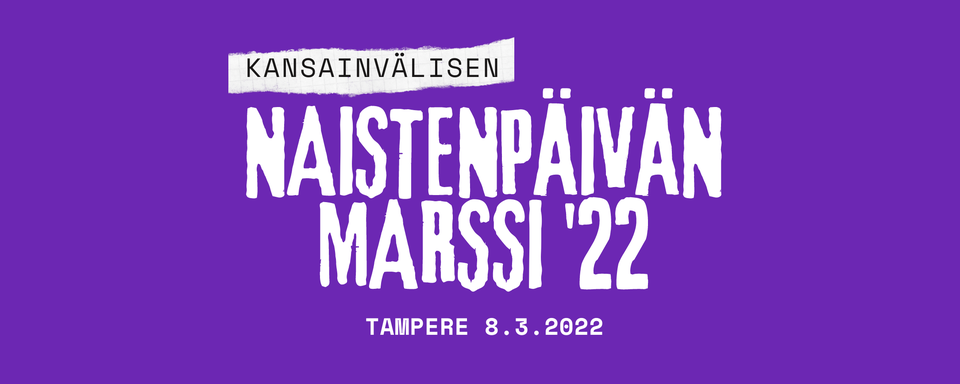Women ‘s Day march Tampere 2022-invite (Naistenpäivä Tampere 2022)

We’d like to welcome you to march with us on the International Women’s Day on Tuesday 8.3.2022! The march will gather and start its formation at Tullikamarin aukio, Tampere at six PM (18:00).
What does the International Women’s Day and women’s movement mean to you?
This year’s march encourages you to form your own blocs regardless of its size. You can also participate in any of the already upcoming blocs which can be learned more about in our coming posts.
If you want to organize your own bloc, let us know about it via email: naistenmarssi2022@gmail.com, you can also send us your manifesto for us to release on our social media.
History is filled with varied of ways to celebrate the Women’s Day but the most important ones to note out of women’s movement’s history: the working women’s movement’s influence – under the leadership of Clara Zetkin the International Women’s Day was first organized 112 years ago in the year 1910. International Women’s Day was chosen to be celebrated on the 8th of March in honor of the 1917 Women’s Day organized by the women textile workers of St. Petersburg which erupted into a widespread rebellion against the dominant system with vocal demands for “peace and bread”.
First International Women’s Days of history were celebrated with the theme of “voting rights for all” (not only to bourgeois women as demanded by the Suffragettes, for example).
Later several other themes wete brought up like the prices of consumer goods, opposition to imperialist wars and women’s economic status.
Even today we need International Women’s Day and women’s movement!
Violence against women and the amount of femicides have been rising globally and Finland isn’t an exception to this trend. Legal rights, like the right to abortion, that have been fought for and attained are under attack in several different countries.
The situation in predominantly female industries is unbearable: they are under-resourced and still experience salary lag.
The pace of work in social and healthcare industries is being increased and with it the accompanying burden. Derogation is being used to stop justified labor struggles. According to a survey carried out by the universities of Helsinki and Tampere, the workers in service industry are left hungry when the wage along with the benefits from the social services just isn’t enough to live on.
Women aren’t any safer in their workplaces than anywhere else in society: they get to experience anything from sexual harrasment to acts of violence in their places of employment. Policies to counteract COVID’s spread have increased misery, unemployment and poverty and this all has been placed disproportionally on women’s shoulders.
Women are both this country’s and this world’s oppressed half. Every women won’t of course experience oppression identically, worker and peasant women are the most exploited majority of women and they face patriarchy at its most bare and brutal form. Women’s status in the exploited countries is the most bleak. A portion of those already living under multiple forms of oppression are also part of indigenous or other oppressed peoples. Along with these afromentioned factors, women’s status in society can also be affected by racism, persecution and discrimination against different nationalities. Also the status of those women who are disabled or are part of sexual or gender minorities, and religion is to be taken account for.
Patriarchy is a structural part of world order which puts down the majority of humanity, putting unreasonable weight on the backs of poor countries and on the world’s poorest peoples – especially the womens.
So it should not come as a surprise that the women’s movement is growing especially in these oppressed countries. For example, last year’s massive International Women’s Day mobilizations were held while defying COVID-restrictions in Ankara, Turkey. It’s main themes were opposing the arrests of political female prisoners, the oppression of women and the Turkish state’s actions under the guise of the ongoing pandemic. Brazil’s People’s Women’s Movement (Movimento Feminino Popular) has made significant work politicizing and mobilizing the society’s most downtrotten women in one of the world’s most dangerous countries for women. Europe has also seen huge mobilizations, for example Poland’s struggle for abortion rights has been fought with one of their slogans being “My womb is not a chapel” (“Moja macica nie kaplica”).
Even on this year’s 8th of March we’ll see how women around the world will march for the international women’s movement and against patriarchy defying the most horrible conditions they find themselves in. History has taught us that all achievements and advancements must be fought for and we simply can’t afford not to fight against oppression and misery, to fight for a better world.
Long live the past, the present and the future heroes of the women’s movement!
Long live the international women’s movement!
Fill the streets 8.3.2022!
